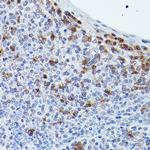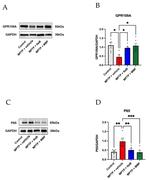Search Thermo Fisher Scientific
FIGURE: 1 / 3
GPR109 Antibody (PA5-90579) in IHC (P)



Product Details
PA5-90579
Species Reactivity
Published species
Host/Isotype
Class
Type
Immunogen
Conjugate
Form
Concentration
Purification
Storage buffer
Contains
Storage conditions
Shipping conditions
RRID
Product Specific Information
Immunogen sequence: KKMPIQNGGA NLCSSFSI
Positive Samples: HepG2, Rat heart
Target Information
GPR109A (also known as HCA2, HM74a, and NIACR1) is a 42kDa G-protein coupled receptor that belongs to a family of three hydroxyl-carboxylic acid receptors, which also include GPR109B and GPR81. GPR109A has two known ligands: niacin and butyrate (or its derivative 3-hydroxybutyrate). The endogenous ligands for GPR109B and GPR81 are 3-hydroxyl-octanoic acid and 2-hydroxy-propanoate (lactate), respectively. GPR109A is expressed on adipocytes, neutrophils, Langerhans cells, keratinocytes, intestinal epithelial cells, and intestinal colonic macrophages. Niacin, also known as nicotinic acid or vitamin B3, is known to improve cholesterol metabolism (LDL/HDL ratio) and reduce inflammation. It has been demonstrated that this effect is mediated through GPR109A. Notably, GPR109A also has an essential role in suppressing inflammation and cancer in the colon. Both GPR109A ligands are produced by colonic commensal bacteria. In mice, GPR109A expression on intestinal epithelial cells and DCs/macrophages contributes to the suppression of colitis and colon cancer. In humans, GPR109A is silenced in colon carcinoma cells by DNA methylation, which increases inflammation in the intestinal tract.
For Research Use Only. Not for use in diagnostic procedures. Not for resale without express authorization.
Bioinformatics
Protein Aliases: G protein-coupled receptor 109A; G protein-coupled receptor 109B; G protein-coupled receptor HM74a; G-protein coupled receptor 109; G-protein coupled receptor 109A; G-protein coupled receptor HM74; G-protein coupled receptor HM74A; hydroxy-carboxylic acid receptor 2; Hydroxycarboxylic acid receptor 2; interferon-gamma inducible gene, Puma-g; Niacin receptor 1; Nicotinic acid receptor; Protein PUMA-G; PUMA-G. GPR109; putative seven transmembrane spanning receptor
Gene Aliases: Gpr109; GPR109A; Gpr109b; HCA2; HCAR2; HM74; HM74A; HM74b; mHM74b; NIACR1; PUMA-G; PUMAG
UniProt ID: (Human) Q8TDS4, (Mouse) Q9EP66
Entrez Gene ID: (Human) 338442, (Mouse) 80885

Performance Guarantee
If an Invitrogen™ antibody doesn't perform as described on our website or datasheet,we'll replace the product at no cost to you, or provide you with a credit for a future purchase.*
Learn more
We're here to help
Get expert recommendations for common problems or connect directly with an on staff expert for technical assistance related to applications, equipment and general product use.
Contact tech support
